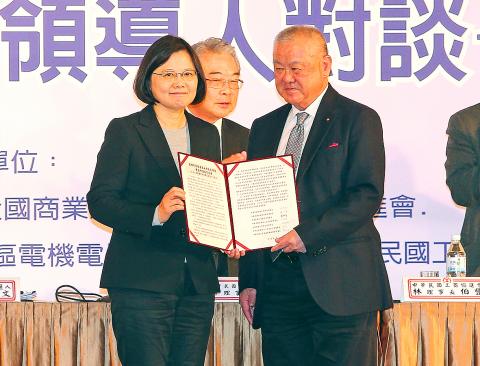Democratic Progressive Party (DPP) presidential candidate Tsai Ing-wen (蔡英文) yesterday told business leaders that her team has prepared extensive energy polices, including the formation of a Cabinet task force to avert any power shortage risks over the next few years.
Tsai made the remarks at her first large-scale discussion with the nation’s six major industrial groups, including the Chinese National Federation of Industries (工總) and the Taiwan Electrical and Electronic Manufacturers’ Association (電電公會).
Yesterday’s meeting was the first forum arranged by industrial groups to discuss insights about relations with China and economic policies with candidates of the three Jan. 16 presidential election tickets.

Photo: CNA
Of the 13 key issues of concern to local industries, how to maintain a stable supply of power topped the list, as Taiwan faces an imminent risk of power supply constraints next year, which could leave companies’ operations in dire condition.
Tsai said she did not expect the nation to suffer from power shortages over the next few years if state-run Taiwan Power Co (Taipower, 台電) can fully carry out its power capacity expansion plans.
A Taipower assessment said the nation could face power shortages, as the company estimates its reserve energy capacity could fall from an estimate of 10.4 percent this year to less than 10 percent of the nation’s needs at peak times next year.
“Our goal is to keep reserve energy capacity above 7.5 percent, which would help us avoid power rationing,” Tsai said.
It is critical for the government to manage power capacity, boost power efficiency, create “green” energy solutions and save energy, Tsai said.
If elected as the nation’s president, Tsai said that she plans to boost the government’s role in tackling energy problems by setting up a task force under the Cabinet.
The Environmental Protection Administration is currently in charge of drawing energy polices.
The task force would be responsible for making energy policies on cutting carbon emissions to meet global standards and reducing energy consumption during peak hours in summer, Tsai said.
The US reduced electricity consumption by 9.2 percent after it, in 2013, implemented electricity rates that favor energy use during off-peak hours and plans to further reduce power consumption by 20 percent by 2020, Tsai said.
The specially designated panel would be in charge of promoting “green” energy, such as solar power; liberalizing the electricity sector; and saving energy, she added.
Expanding the use of smart meters from industrial users to common households and increasing use of energy-efficient equipment and lighting would also be on her agenda, Tsai said.
Talking about her policies on cross-strait relations, Tsai said that she would keep “stable” ties with China.
“Maintaining the ‘status quo’ is my primary and most important direction,” Tsai said.
Taiwan is a democratic nation, Tsai said, adding that she would be following the public’s will by maintaining the “status quo,” without blending any political party’s ideology.
When tackling cross-strait issues, “we will try not to provoke [China]. We will try to communicate with [China]. We do not expect to see anything unexpected. We want to keep relations stable,” Tsai said.

Right-wing political scientist Laura Fernandez on Sunday won Costa Rica’s presidential election by a landslide, after promising to crack down on rising violence linked to the cocaine trade. Fernandez’s nearest rival, economist Alvaro Ramos, conceded defeat as results showed the ruling party far exceeding the threshold of 40 percent needed to avoid a runoff. With 94 percent of polling stations counted, the political heir of outgoing Costa Rican President Rodrigo Chaves had captured 48.3 percent of the vote compared with Ramos’ 33.4 percent, the Supreme Electoral Tribunal said. As soon as the first results were announced, members of Fernandez’s Sovereign People’s Party

MORE RESPONSIBILITY: Draftees would be expected to fight alongside professional soldiers, likely requiring the transformation of some training brigades into combat units The armed forces are to start incorporating new conscripts into combined arms brigades this year to enhance combat readiness, the Executive Yuan’s latest policy report said. The new policy would affect Taiwanese men entering the military for their compulsory service, which was extended to one year under reforms by then-president Tsai Ing-wen (蔡英文) in 2022. The conscripts would be trained to operate machine guns, uncrewed aerial vehicles, anti-tank guided missile launchers and Stinger air defense systems, the report said, adding that the basic training would be lengthened to eight weeks. After basic training, conscripts would be sorted into infantry battalions that would take

GROWING AMBITIONS: The scale and tempo of the operations show that the Strait has become the core theater for China to expand its security interests, the report said Chinese military aircraft incursions around Taiwan have surged nearly 15-fold over the past five years, according to a report released yesterday by the Democratic Progressive Party’s (DPP) Department of China Affairs. Sorties in the Taiwan Strait were previously irregular, totaling 380 in 2020, but have since evolved into routine operations, the report showed. “This demonstrates that the Taiwan Strait has become both the starting point and testing ground for Beijing’s expansionist ambitions,” it said. Driven by military expansionism, China is systematically pursuing actions aimed at altering the regional “status quo,” the department said, adding that Taiwan represents the most critical link in China’s

‘REALLY PROUD’: Nvidia would not be possible without Taiwan, Huang said, adding that TSMC would be increasing its capacity by 100 percent Nvidia Corp CEO Jensen Huang (黃仁勳) on Saturday praised and lightly cajoled his major Taiwanese suppliers to produce more to help power strong demand for artificial intelligence (AI), capping a visit to the country of his birth, where he has been mobbed by adoring fans at every step. Speaking at an impromptu press conference in the rain outside a Taipei restaurant, where he had hosted suppliers for a “trillion-dollar dinner,” named after the market capitalization of those firms attending, Huang said this would be another good year for business. “TSMC needs to work very hard this year because I need a lot